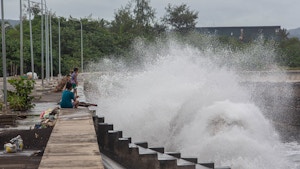#economy News

The republic will not “capitulate”, but will forge global cooperation to tackle challenges like climate change, says prime minister Lawrence Wong. His speech was made a day after it was confirmed Singapore will head to the polls on 3 May.

Corporate Responsibility
Gradual salary raise key to achieving living wage in the Philippines: industry experts
EB Studio
As lawmakers mull an across-the-board increase for minimum wage earners, observers at a panel in Manila push for a staggered process in order to balance needs of workers, employers, and its impact on the economy.

While they bet big on artificial intelligence and product carbon-footprint tracking, more action is needed to drive greener consumption, experts say.

The Philippines, Vietnam, Malaysia, and Thailand have named extreme weather as their top concern, putting it ahead of issues like unemployment and economic recession, a study by the ISEAS-Yusof Ishak Institute finds.
Policy & Finance
Q&A: How China’s ‘two new’ policy aims to help cut emissions
Food & Agriculture
India's farm insurance proves costly for most vulnerable
#economy Opinion

Food & Agriculture
Migrant agriculture workers: potential resource for Southeast Asia’s food-resilient future
Farm labourers returning from overseas can, if empowered, form a pool of experienced talent that Southeast Asia’s vulnerable agricultural sector can tap into for food security.

Policy & Finance
Financial inclusion must reach the last billion
With the globalisation engine no longer as powerful as it once was, economic growth alone is unlikely to eradicate poverty. One complementary approach is to bolster financial inclusion.

Energy transition research addressing the range of equity concerns across India’s socioeconomic groups and regions is rare. This needs to change.

Policy & Finance
Central banks must stem the nature crisis
Even though the global economy depends on a stable climate and reliable ecosystem services, businesses and financial institutions are not required or incentivised to invest in nature. Central banks and supervisors could change that trajectory simply by fulfilling their financial-stability mandate.
Corporate Responsibility
As sustainability faces scrutiny, businesses need to rethink their focus – but not their values
#economy Videos

Policy & Finance
Navigating uncertainty: AIA’s long-term bet on sustainable investing
In this wide-ranging fireside chat moderated by Eco-Business CEO Jessica Cheam, AIA Group's chief investment officer Dr Mark Konyn asserts there is “no U-turn” among corporates invested for the long term, even as political regimes change amid a new world order.

Corporate Responsibility
Explainer: How does corporate purpose drive sustainable growth?
EB Studio
Amid fresh debates about what corporate purpose should be, there is mounting evidence that corporate purpose leads to stronger brand reputation, better talent attraction and more resilience, leading to improved financial performance.

Southeast Asia's largest energy consumer has been slow to transition to renewables, but recent policies point to greater expansion of the country's solar, tidal and geothermal energy production.

Carbon & Climate
Is your pension fuelling climate change?
Pension funds are some of the world's largest investors—holding trillions in assets—billions of which are pumped into fossil fuel companies like Shell, BP, and Total.
#economy Podcasts

Trump 2.0 may prove to be a "bump in the road" for climate action, but banks and investors in Asia see growth and opportunity in the region for decarbonisation as climate risks grow.

GoTo sustainability head Tanah Sullivan tells the Eco-Business Podcast that regulating net-zero claims would decarbonise Southeast Asia faster. Indonesia's biggest internet firm aims to cut emissions to zero by 2030 — a target critics say is unrealistic.

Policy & Finance
How can the Philippines make a green recovery in the Covid era?
Exclusive
As the country plunges into a recession borne out of the pandemic, how can it get back on its feet? On this podcast, Eco-Business spoke to top Filipino environmentalist Loren Legarda on how conservation should not take a backseat to economic development.

Policy & Finance
Green finance: Will banks tell us how they spend our money?
Fossil fuels, tobacco, weapons—our banks could be spending our money on things we don't want them to. Eco-Business talks to finance expert Mayur Singh about why consumers in Asia should asking banks how they spend their money.
#economy Press Releases

UN Trade and Development (UNCTAD)
The poor, vulnerable risk being overlooked in escalating trade tensions

UN Trade and Development (UNCTAD)
Reciprocal tariffs should exclude vulnerable developing countries: UN trade body

UN Trade and Development (UNCTAD)
Global trade in 2025: Resilience under pressure

UN Trade and Development (UNCTAD)
Financing for development: Reforming global systems to drive progress
#economy Research

Centre for Asian Philanthropy and Society (CAPS)
Public-private partnerships for social good

United Nations Environment Programme / International Resource Panel
Governing coastal resources: Implications for a sustainable blue economy

Accenture and WWF-Singapore
Sustainability in Singapore—consumer and business opportunities








